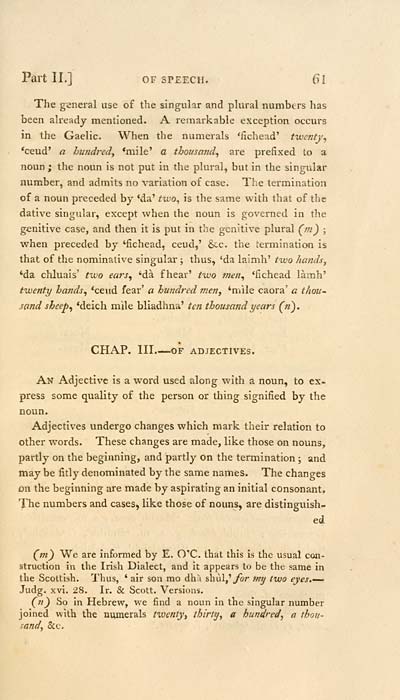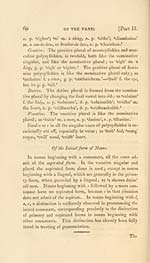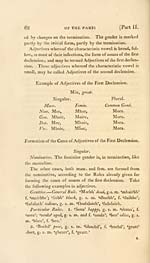Download files
Complete book:
Individual page:
Thumbnail gallery: Grid view | List view

Part II.] OF SPEECH. 61
The general use of the singular and plural numbers has
been already mentioned. A remarkable exception occurs
in the Gaelic. When the numerals 'fichead' tiventy,
*ceud' a hundred, *mile' a thousarid, are prefixed to a
noun ; the noun is not put in the plural, but in the singular
number, and admits no variation of case. The termination
of a noun preceded by *da' two^ is the same with that of the
dative singular, except when the noun is governed in the
genitive case, and then it is put in the genitive plural (^m) ;
when preceded by 'fichead, ceud,' &c. the terminaticHi is
that of the nominative singular ; thus, 'da laimh' two hands,
'da chluais' two ears^ 'da fhear' two men^ 'lìchead làmh'
twenty hands^ *ceud fear' a hundred men, 'mile caora' a thou-
sand sheep^ 'deich mile bliadhna' ten thousand years (n).
CHAP. Ill OF ADJECTIVES.
An Adjective is a word used along with a noun, to ex-
press some quality of the person or thing signified by the
noun.
Adjectives undergo changes which mark their relation to
other words. These changes are made, like those on nouns,
partly on the beginning, and partly on the termination ; and
may be fitly denominated by the same names. The changes
on the beginning are made by aspirating an initial consonant.
The numbers and cases, like those of nouns, are distinguish-
ed
(m) We are informed by E. 0*C. that this is the usual con-
struction in the Irish Dialect, and it appears to be the same in
the Scottish. Thus, ' air son mo dha shùl,'^r My two eyes.—-
Judg. xvi. 28. Ir. & Scott. Versions.
(ri) So in Hebrew, we find a noun in the singular number
joined with the numerals tiventj, thirty, a hundred, a thou-
tand, &c.
The general use of the singular and plural numbers has
been already mentioned. A remarkable exception occurs
in the Gaelic. When the numerals 'fichead' tiventy,
*ceud' a hundred, *mile' a thousarid, are prefixed to a
noun ; the noun is not put in the plural, but in the singular
number, and admits no variation of case. The termination
of a noun preceded by *da' two^ is the same with that of the
dative singular, except when the noun is governed in the
genitive case, and then it is put in the genitive plural (^m) ;
when preceded by 'fichead, ceud,' &c. the terminaticHi is
that of the nominative singular ; thus, 'da laimh' two hands,
'da chluais' two ears^ 'da fhear' two men^ 'lìchead làmh'
twenty hands^ *ceud fear' a hundred men, 'mile caora' a thou-
sand sheep^ 'deich mile bliadhna' ten thousand years (n).
CHAP. Ill OF ADJECTIVES.
An Adjective is a word used along with a noun, to ex-
press some quality of the person or thing signified by the
noun.
Adjectives undergo changes which mark their relation to
other words. These changes are made, like those on nouns,
partly on the beginning, and partly on the termination ; and
may be fitly denominated by the same names. The changes
on the beginning are made by aspirating an initial consonant.
The numbers and cases, like those of nouns, are distinguish-
ed
(m) We are informed by E. 0*C. that this is the usual con-
struction in the Irish Dialect, and it appears to be the same in
the Scottish. Thus, ' air son mo dha shùl,'^r My two eyes.—-
Judg. xvi. 28. Ir. & Scott. Versions.
(ri) So in Hebrew, we find a noun in the singular number
joined with the numerals tiventj, thirty, a hundred, a thou-
tand, &c.
Set display mode to: Large image | Transcription
Images and transcriptions on this page, including medium image downloads, may be used under the Creative Commons Attribution 4.0 International Licence unless otherwise stated. ![]()
| Early Gaelic Book Collections > Blair Collection > Elements of Gaelic grammar > (91) |
|---|
| Permanent URL | https://digital.nls.uk/79041067 |
|---|
| Description | A selection of books from a collection of more than 500 titles, mostly on religious and literary topics. Also includes some material dealing with other Celtic languages and societies. Collection created towards the end of the 19th century by Lady Evelyn Stewart Murray. |
|---|
| Description | Selected items from five 'Special and Named Printed Collections'. Includes books in Gaelic and other Celtic languages, works about the Gaels, their languages, literature, culture and history. |
|---|

